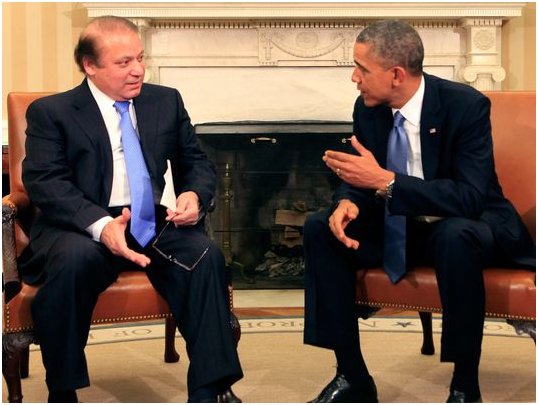Is A US-Pak Nuclear Deal On The Table?
A good conversation?

NEW DELHI: A report by a top US think tank has said that Pakistan is poised to become the fifth largest nuclear weapons state in the world by 2025. "Pakistan has a nuclear weapons stockpile of 110 to 130 warheads, an increase from an estimated 90 to 110 warheads in 2011," the report, titled 'Pakistani nuclear forces 2015', says, adding that the stockpile could grow to 220-230 warheads by 2025.
"With several delivery systems in development, four operating plutonium production reactors, and uranium facilities, the country's stockpile will likely increase over the next 10 years, but by how much will depend on many things," the report adds.
Meanwhile, Pakistani Prime Minister Nawaz Sharif arrived in the United States, with speculation rife on the prospects of a US-Pakistan nuclear deal that involves limits on Pakistan’s nuclear arsenal.
The White House, whilst confirming that “nuclear security” could figure in the talks between the two countries, indicated that “a deal like the one that's been discussed publicly” is unlikely. "But the United States and Pakistan are regularly engaged in a dialogue about the importance of nuclear security and I would anticipate that dialogue would include conversations between the leaders of our two countries,” said White House spokesperson Josh Earnest.
Pakistan too rubbished the speculation, with Foreign Office spokesman Qazi Khalilullah saying that no such deal was on the table. "US has not made any demand from Pakistan," he said. "In any case, history is a testimony to the fact that Prime Minister Nawaz Sharif accepts no demand from any state. He firmly believes in policies directed at preserving, protecting and promoting Pakistan's national interests.”
Nawaz Sharif responded to the reports saying that no compromise on Pakistan’s nuclear assets will be made. A report in Dunya News states: “Talking to media in London before leaving for United States (US), PM Nawaz said that his visit will improve the relations between the two countries. Answering a question on this occasion, PM said that he was the Prime Minister of Pakistan at the time of nuclear explosions in 1999. “Who was the PM in 1999 at the time of nuclear explosions? Pakistan’s national interest is our top priority”, said Nawaz. He added that no compromise on Pakistan’s policy about nuclear assets is possible.”
Pakistan, according to several independent measures, has the world’s fastest growing nuclear programme. A report this year by the US-based Council for Foreign Relations titled, “Strategic Stability in the Second Nuclear Age” stated that “By 2020, it [Pakistan] could have a stockpile of fissile material that, if weaponized, could produce as many as two hundred nuclear devices.”
The CFR report further notes that South Asia is the region “most at risk of a breakdown in strategic stability due to an explosive mixture of unresolved territorial disputes, cross-border terrorism, and growing nuclear arsenals.” “Due to the security trilemma, the deterrence relationship between India and Pakistan is intertwined with that of China. This trilateral linkage increases the region’s susceptibility to outside shocks and amplifies the risk that regional developments will have far-reaching effects. Each of these dynamics is worrisome on its own, but the combination of them could be particularly destabilizing,” the report had said.
Further, the safety of Pakistan’s nuclear arsenal has long been a subject of policy debate, despite repeated efforts by international watchdogs to vouch for its safety.
Nor are these concerns new; they have persisted ever since the country conducted nuclear tests in 1998. The “Global Trends 2030: Alternative Worlds” Report by the National Intelligence Council states, “Nuclear Powers .. such as Pakistan ..see nuclear weapons as compensation for other political and security weaknesses, heightening the risk of their use.” More significantly, the country’s instability and precarious relationship with violent militant groups is often highlighted as a cause for concern, with watchdogs cautioning the possibility of non-state actors acquiring nuclear weapons or a radical takeover placing safety and security concerns at risk. Former International Atomic Energy Agency (IAEA) Director General Mohamed ElBaradei expressed fears that a radical regime could take power in Pakistan, and thereby acquire nuclear weapons. Experts also worry that technology could be sold off by insiders during a worsened crisis.
These concerns are not unfounded. In 2004, nuclear scientist Dr AQ Khan confessed to the illicit transfer of nuclear weapons technology to Iran, Libya, North Korea and other countries. Additionally, according to reports, Al Qaeda unsuccessfully sought nuclear weapons assistance from Khan, but did receive help from at least one other group in Pakistan - possibly retired Pakistan Atomic Energy Commission scientists Sultan Bashiruddin Mahmood and Chaudiri Abdul Majeed. Although details are not clear, it is a known fact that the charity set up by the two scientists known as the Ummah Tameer-e-Nau (UTN) had links to the Taliban and Al Qaeda. In 2012, a group of nine militants attacked the Kamra Air Base that had long been suspected of housing nuclear weapons. Although Pakistan has long denied this claim, the incident raised concerns about the security of Pakistan’s nuclear programme.
Given the above, it’s not surprising that the US may want to institute checks and monitoring on Pakistan’s nuclear assets. Whether this will eventuate, however, seems unlikely at present.



